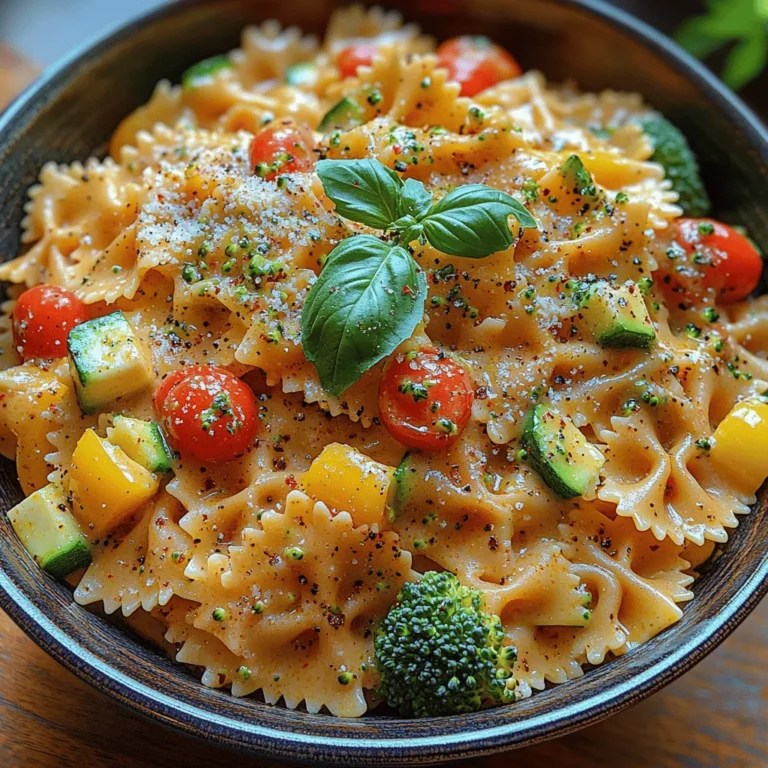Vibrant Creamy Pasta Primavera: The Joy of Colorful Comfort Food
There’s something incredibly comforting about a big bowl of pasta, isn’t there? It’s the ultimate embrace on a busy weeknight or a lazy Sunday afternoon. The mere thought of twirling forkfuls of pasta coated in a rich, creamy sauce, surrounded by vibrant vegetables, can bring a sense of warmth and satisfaction. One recipe that captures this comfort beautifully is the Vibrant Creamy Pasta Primavera.
The origins of Pasta Primavera can be traced back to the Italian-American cuisine of the 1970s, where it was created as a celebration of spring’s bounty. The word “primavera” translates to “spring” in Italian, and this dish embodies the freshness of the season with its colorful array of vegetables. While it has evolved over the years, the essence of Pasta Primavera remains the same: to showcase the beauty and flavor of fresh produce.
I still remember the first time I made Pasta Primavera; it was a sun-drenched day, and the farmer’s market was bursting with colorful vegetables. I couldn’t resist picking up a rainbow of bell peppers, crisp asparagus, and juicy cherry tomatoes. That evening, as I sautéed and stirred, the kitchen filled with vibrant aromas that danced through the air. The combination of sautéed vegetables and creamy sauce created an inviting atmosphere that felt like a warm hug after a long day. Ever since, this Vibrant Creamy Pasta Primavera has become a staple in my home—a dish that not only bursts with flavor and color but also brings a sense of joy to the table.
Now, let’s dive into how you can recreate this delightful dish in your own kitchen.
Gathering the Ingredients
The beauty of Vibrant Creamy Pasta Primavera lies in its simplicity and the freshness of its ingredients. You don’t need to be a gourmet chef to whip up this dish, and it’s a fantastic way to use up whatever vegetables you have on hand. Here’s what you’ll need to create this delicious meal:
– 12 ounces of farfalle pasta (or any pasta of your choice): The bowtie shape holds onto the creamy sauce beautifully, making each bite a delightful experience.
– 2 tablespoons of extra-virgin olive oil: A staple in any kitchen, it adds richness and depth to the dish. It’s best to use high-quality olive oil to enhance the flavors of your ingredients.
– 1 medium onion, finely chopped: This aromatic base creates a wonderful foundation for the flavors. When sautéed, onions become sweet and tender, adding depth to your sauce.
– 2 cloves of garlic, minced: Garlic adds a fragrant punch that elevates any dish. Cooking it gently allows the garlic to infuse the oil and vegetables with its aromatic essence.
– 1 cup of assorted bell peppers (red, yellow, green), sliced into strips: Their sweetness and crunch are essential for that primavera feel. Each color offers a slight variation in flavor, contributing to the dish’s overall complexity.
– 1 medium zucchini, sliced into half-moons: Zucchini adds a tender texture and mild flavor, balancing the robustness of the other vegetables.
– 1 cup of cherry tomatoes, halved: Juicy and sweet, these burst with flavor when cooked. They not only add brightness to the dish but also provide a lovely contrast in texture.
– 1 cup of fresh broccoli florets: A pop of green that’s packed with nutrients. Broccoli adds a satisfying crunch and a slight earthiness that complements the other vegetables.
– 1 cup of asparagus, cut into 2-inch pieces: Tender asparagus adds an earthy note. Its unique flavor profile pairs well with the creaminess of the sauce.
– 1 cup of heavy cream: This is what makes the sauce luxuriously creamy. The richness of the cream envelops the pasta and vegetables, creating an indulgent dish.
– 1 cup of freshly grated Parmesan cheese: The cheese adds a salty, savory flavor that makes everything better. Freshly grated cheese melts beautifully into the sauce, enhancing its creaminess.
Preparing the Pasta and Vegetables
Now that you have your ingredients ready, it’s time to bring this dish to life. Start by cooking the pasta according to the package instructions. It’s essential to cook the pasta al dente, as it will continue to cook slightly when combined with the sauce. While the pasta is boiling, you can prepare the vegetables.
In a large skillet, heat the extra-virgin olive oil over medium heat. Once the oil is shimmering, add the finely chopped onions. Sauté them for about 2-3 minutes until they become translucent, stirring occasionally to prevent them from browning. Next, add the minced garlic and sauté for an additional minute. The sweet aroma will fill your kitchen, setting the stage for the vibrant flavors to come.
Once the onions and garlic are fragrant, it’s time to introduce the colorful bell peppers. Add the sliced bell peppers to the skillet and sauté for another 3-4 minutes until they begin to soften. The goal here is to allow the vegetables to retain some of their crunch while developing a lovely sweetness.
Next, add the zucchini, cherry tomatoes, broccoli florets, and asparagus to the skillet. Stir everything together and cook for another 5-7 minutes, until the vegetables are tender but still bright and colorful. This is where the magic happens—the vibrant mix of colors and textures creates a feast for the eyes, and the aroma is simply irresistible.
Once the vegetables are cooked to your liking, it’s time to incorporate the creamy sauce. Reduce the heat to low and pour in the heavy cream, stirring gently to combine. Allow the cream to warm through for a minute or two, letting it meld with the vegetables. Then, gradually add the freshly grated Parmesan cheese, stirring continuously until it melts into the sauce and creates a velvety consistency. The combination of the cream and cheese transforms the dish into a rich, comforting delight.
At this point, your pasta should be cooked to perfection. Drain the pasta and reserve a cup of the pasta cooking water in case you need to thin out the sauce later. Add the drained pasta to the skillet with the creamy vegetable sauce, tossing it gently to ensure every piece is coated in the luscious sauce.
If the sauce appears too thick, you can add a splash of the reserved pasta water to achieve your desired consistency. The result is a beautifully creamy pasta that clings to the noodles and envelops the colorful vegetables, creating a dish that is as pleasing to the palate as it is to the eye.
As you plate your Vibrant Creamy Pasta Primavera, consider garnishing it with additional Parmesan cheese and a sprinkle of freshly cracked black pepper. This final touch elevates the dish, making it even more inviting.
This recipe not only provides a comforting meal but also serves as a reminder of the joys of cooking with fresh, seasonal ingredients. Whether you’re enjoying it on a quiet evening at home or sharing it with family and friends, this pasta dish is sure to bring a smile to everyone’s face. Stay tuned for part two, where we’ll explore some variations, serving suggestions, and tips to make this dish even more delightful!
{{image_2}}
Salt and Pepper to Taste
Salt and pepper are essential seasonings that enhance all the flavors in your Vibrant Creamy Pasta Primavera. A dash of salt brings out the natural sweetness of the vegetables, while pepper adds a touch of warmth. Adjust these seasonings to your preference, tasting as you go to create the perfect balance.
Italian Seasoning
Adding 1 teaspoon of Italian seasoning gives your dish a blend of dried herbs that adds warmth and complexity. This combination typically includes basil, oregano, thyme, and rosemary, creating a lovely aromatic profile that complements both the pasta and the vegetables beautifully.
Fresh Basil Leaves, for Garnish
Fresh basil leaves are a must for garnishing your pasta primavera. They add a refreshing finish to the dish, elevating its appearance and flavor. Simply tear the basil leaves and scatter them over the top just before serving for that perfect touch of freshness.
Optional: Red Pepper Flakes for an Extra Kick
If you enjoy a little heat, consider adding red pepper flakes to your pasta primavera. This optional ingredient can bring a delightful kick to the dish, balancing the creaminess of the sauce and making each bite even more exciting. Adjust the amount according to your spice tolerance.
Preparation Steps
Now that you have your ingredients ready, let’s walk through the steps to create this delicious dish.
Step 1: Cook the Pasta
Start by cooking the pasta. Bring a large pot of salted water to a boil, and cook the farfalle pasta according to the package directions until al dente. It’s crucial to reserve about half a cup of the pasta cooking water before draining the pasta. This starchy water is a secret ingredient that will help adjust the sauce’s consistency later.
Step 2: Sauté the Aromatics
While the pasta is cooking, heat the olive oil in a large skillet over medium heat. Once the oil is hot, add the finely chopped onion. Sauté it for about 3-4 minutes until it turns translucent, filling your kitchen with that unmistakable aroma. This is the base of your dish, so take your time to allow the onion to develop its flavor. Next, toss in the minced garlic and sauté for another 30 seconds. This is where the magic starts to happen! The fragrance of garlic combined with onion will make your dish irresistible.
Step 3: Add the Vegetables
Now, it’s time to add your vibrant veggies. Stir in the sliced bell peppers, zucchini, cherry tomatoes, broccoli florets, and asparagus. Season them with salt, pepper, and Italian seasoning, and sauté for about 5-7 minutes until the vegetables are tender but still vibrant in color. You want them to have a nice bite to them, adding texture to your dish. Remember, the goal is to keep the veggies crisp and colorful, making your pasta primavera not only delicious but visually appealing.
Step 4: Create the Creamy Sauce
Once the vegetables are perfectly sautéed, reduce the heat to low and pour in the heavy cream, stirring continuously to combine. Gradually add the freshly grated Parmesan cheese, mixing until it’s melted and the sauce is smooth. If you find the sauce is too thick, don’t hesitate to add a splash of the reserved pasta water until you achieve your desired creaminess. The cream will envelop the vegetables and pasta beautifully, creating a luscious sauce that coats every bite.
Step 5: Combine Pasta and Sauce
Now that your sauce is ready, add the drained pasta to the skillet, gently tossing to ensure that every piece is well-coated. It’s important to take your time with this step to make sure the pasta absorbs all the flavors from the sauce. Let it cook for an additional 2-3 minutes to heat everything through, allowing the pasta to soak up the creamy goodness.
Step 6: Garnish and Serve
Finally, remove the skillet from the heat. Garnish your Vibrant Creamy Pasta Primavera with fresh basil leaves and, if you like a little heat, a sprinkle of red pepper flakes. This final touch not only enhances the dish’s flavor but also adds a splash of color to your plate. Serve immediately and enjoy the colorful explosion of flavors.
Tips & Tricks for the Perfect Pasta Primavera
To elevate your Pasta Primavera even further, here are some tips and tricks:
Choose Fresh, Seasonal Vegetables
The fresher the ingredients, the more vibrant your dish will be. Try to pick seasonal produce for the best flavor. Visiting local farmers’ markets can provide you with the freshest options that are in season, making your dish even more delightful.
Don’t Overcook the Vegetables
To retain the vibrant colors and textures of your vegetables, avoid overcooking them. Sauté them just until they are tender yet crisp. This will enhance the overall presentation and keep your dish looking appealing.
Experiment with Different Veggies
Feel free to experiment with different vegetables based on your preferences or what you have on hand. Other great options include snap peas, carrots, or even green beans. The key is to balance colors and textures to create a visually stunning dish.
Add Protein for a Heartier Meal
If you want to make your pasta primavera more filling, consider adding protein such as grilled chicken, shrimp, or chickpeas. This will make it a complete meal, perfect for lunch or dinner.
Serve with Crusty Bread
Pair your pasta primavera with some crusty bread to soak up the delicious creamy sauce. A side salad can also complement the meal, adding freshness and crunch.
Serving Suggestions
Vibrant Creamy Pasta Primavera is versatile and can be served in various ways:
– As a Main Dish: This pasta can stand alone as a hearty main dish, especially when paired with protein.
– As a Side Dish: Serve smaller portions as a side dish alongside grilled meats or fish for a colorful and flavorful accompaniment.
– Meal Prep: This dish can be made ahead of time and stored in the refrigerator. It reheats beautifully, making it a great option for meal prep or busy weeknights.
Conclusion
In conclusion, Vibrant Creamy Pasta Primavera is not only a feast for the eyes but also a delightful experience for your taste buds. With its fresh vegetables, creamy sauce, and comforting pasta, it is a versatile dish that can be enjoyed on various occasions. Whether you’re serving it at a family gathering or enjoying a cozy night in, this pasta primavera is sure to impress.
So, gather your ingredients, follow the steps, and savor every bite of this colorful, creamy masterpiece. Don’t forget to share your creations with friends and family, and invite them to join you in experiencing the vibrant flavors of this delightful dish!


